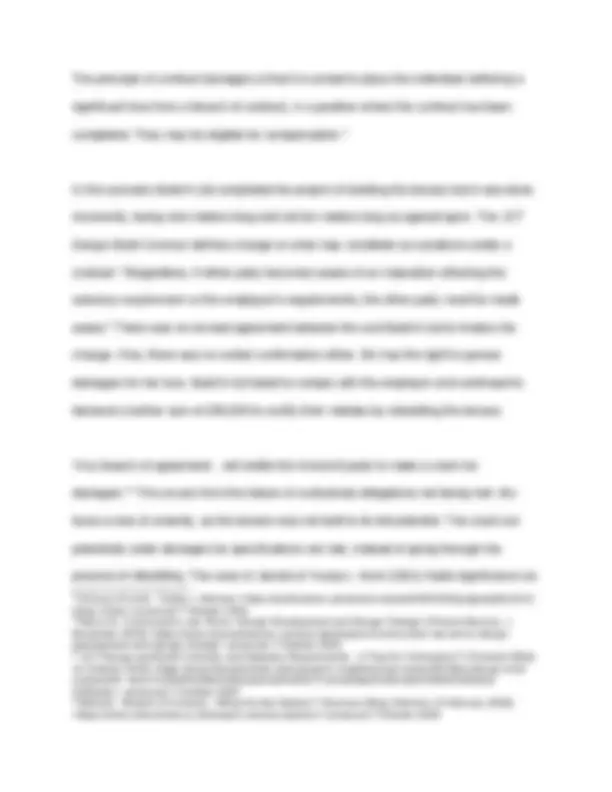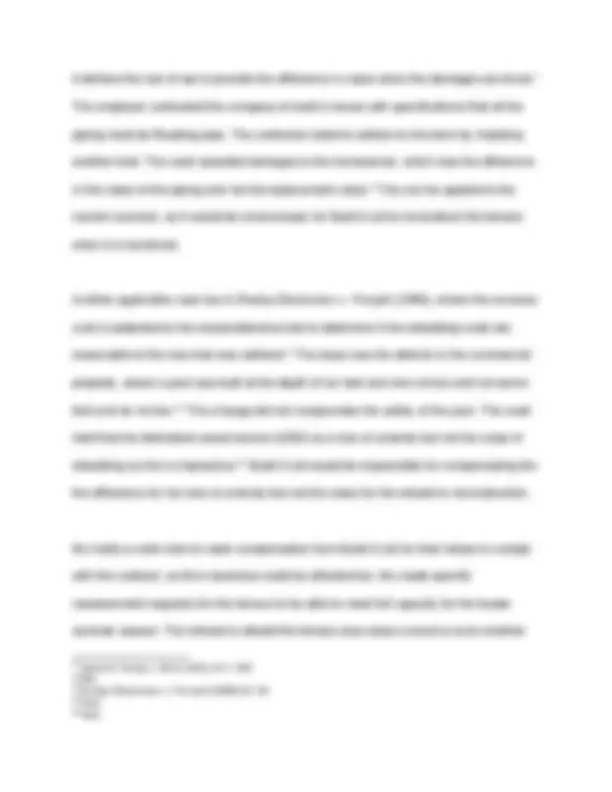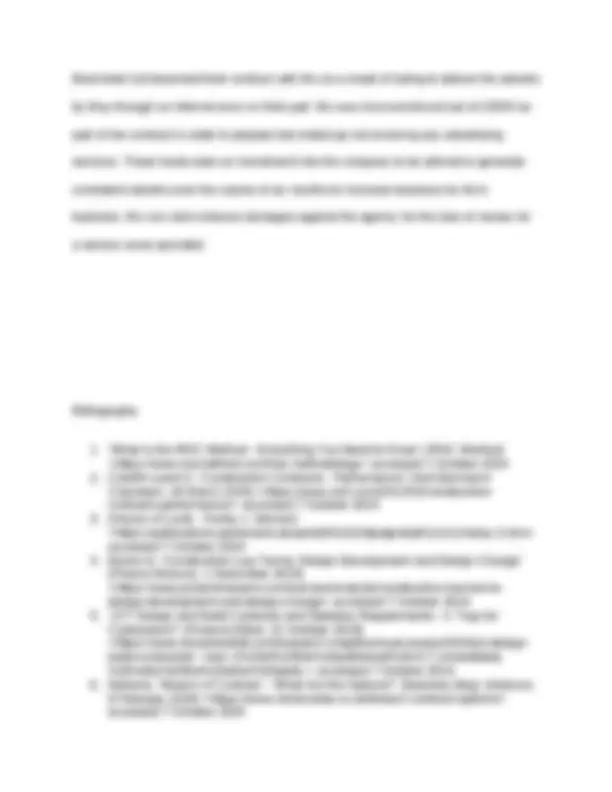








Study with the several resources on Docsity

Earn points by helping other students or get them with a premium plan


Prepare for your exams
Study with the several resources on Docsity

Earn points to download
Earn points by helping other students or get them with a premium plan
Community
Ask the community for help and clear up your study doubts
Discover the best universities in your country according to Docsity users
Free resources
Download our free guides on studying techniques, anxiety management strategies, and thesis advice from Docsity tutors
The legal principles of breach of contract and remedies in the context of three scenarios involving a hotel owner, mo. It analyzes the legal implications of a construction contract breach, a failure to deliver bed linen on time, and an advertising agency's inability to fulfill its advertising obligations. A comprehensive overview of relevant legal principles, case law, and potential remedies for breach of contract, making it a valuable resource for understanding contract law in a practical business setting.
Typology: Assignments
1 / 10

This page cannot be seen from the preview
Don't miss anything!







Mo is the owner of a small boutique hotel in Devon, which requires some upgrading for quality and customer assurance. These tasks require hiring multiple contractors to ensure the job is done in a timely manner. The first contract was established with Built It Ltd to build a terrace. The second contract is conducted with Hotel Linens to replace the old bed linen. The final agreement is agreed upon with Best Hotels Ltd to advertise Mo’s hotel for a set amount of time. However, issues occur when the contract specifications are not met as initially indicated/requested. The breach of the tender will be further
explained using the IRAC (issue, rule, application, conclusion) method, which is a legal technique used to solve legal problems.^1 Scenario 1: Mo and Built It Ltd Mo contracted Built It Ltd to construct a terrace. Specification for the build of the terrace was that it should be five meters wide and ten meters long, at a total cost of £80,000. The project was given a timeframe for completion to be by June 1st, in time for the summer season. The issue is that Built It Ltd failed to deliver on the contract terms and requested an additional £90,000 to rebuild the terrace to the accurate size. There is a breach of contract evident, as the terrace is only nine meters long and not ten meters long. In this scenario, the rule applicable to the lump sum construction contract is that any party’s performance within a contract must be executed in accordance with the agreement.^2 The dimensions for the terrace were confirmed prior to the start of the project yet, Built It Ltd failed to follow the specifications and breached the contract. Although the terrace was completed, Mo did not receive what she expected in the agreement. She may be able to seek remedies. (^1) ‘What Is the IRAC Method - Everything You Need to Know’ ( IRAC Method ) https://www.iracmethod.com/irac-methodology accessed 7 October 2024 (^2) Chaiffin-Laird O, ‘Construction Contracts - Performance’ ( No5 Barristers’ Chambers , 26 March 2024) https://www.no5.com/2012/02/construction-contracts-performance/ accessed 7 October 2024
it defines the rule of law to provide the difference in value when the damages are trivial.^7 The employer contracted the company to build a house with specifications that all the piping must be Reading pipe. The contractor failed to adhere to this term by installing another kind. The court awarded damages to the homeowner, which was the difference in the value of the piping and not the replacement value.^8 This can be applied to the current scenario, as it would be unnecessary for Build It Ltd to reconstruct the terrace when it is functional. Another applicable case law is Ruxley Electronics v. Forsyth (1996), where the recovery cost is subjected to the reasonableness test to determine if the rebuilding costs are reasonable to the loss that was suffered.^9 The issue was the defects in the commercial property, where a pool was built at the depth of six feet and nine inches and not seven feet and six inches.^10 This change did not compromise the safety of the pool. The court held that the defendant would receive £2500 as a loss of amenity but not the value of rebuilding as this is impractical.^11 Build It Ltd would be responsible for compensating Mo the difference for her loss of amenity but not the value for the rebuild or reconstruction. Mo holds a valid claim to seek compensation from Build It Ltd for their failure to comply with the contract, as Mo’s business could be affected too. Mo made specific measurement requests for the terrace to be able to meet full capacity for the busier summer season. The refusal to rebuild the terrace also raises concerns as to whether (^7) Jacob & Young v. Kent (1921) N.Y. 239 (^8) Ibid. (^9) Ruxley Electronics v. Forsyth [1996] AC 34 (^10) Ibid. (^11) Ibid.
the quote initially received was provided correctly. Mo will be awarded her loss of amenity over the breach of contract. Scenario 2: Mo and Hotel Linens Mo contracted Hotel Linens to deliver 30 sets of Egyptian cotton bed linen for the whole price of £4000 by May 1st to replace the older linen at her hotel. However, Hotel Linens failed to comply with the agreed terms and could not meet the delivery date because they ran out of stock. This inconvenience forced Mo to find another seller (Cotton is Us) and spend additional money on the same product. The contract between Hotel Linens and Mo is yet to be fulfilled and this issue has made Mo increase her budget by an additional £1000. The contract between Mo and Hotel Linens is a business-to-business relationship. A contract between both pirates in the sale and purchase of an item would include specifications, customizations, time and date of delivery and the total cost. Failing to adhere to the contract terms in any capacity by either party can amount to a loss of a bargain thus, a breach of contract. Currently, the loss of a bargain is Hotel Linens inability to complete the order and deliver the goods. In this case, the buyer will be able to retrieve damages as compensation, it being the difference of the item at the time of purchase and delivery and when another supplier is confirmed. In the case of British Westinghouse Co v. Underground Electric Railways Co (1912), under the loss of
the requested timeline is negligent on their part and obliged Mo to go the extra mile in order to subside her loss. Both the initial timeline and monetary value increased due to the contract breach. In Pilkington v. Wood (1953), it was established that the claimant cannot be made to take on complicated methods to mitigate their loss.^16 Mo will be eligible to request compensation for her loss from Hotel Linens. Mo has a valid claim against Hotel Linens for compensation due to the contract breach. For failing to comply with the terms being unable to deliver the product within the required timeframe and failing to provide prior notice. Scenario 3: Mo and Hotel Linens Best Hotels Ltd is an advertising agency hired by Mo to promote her hotel. The company was contracted to advertise the hotel for six months, for the fee of £500. Mo spends an additional amount of £1500 for photos to be taken of the hotel and appear in the online advert in May; However, Best Hotels Ltd is unable to advertise the hotel due to a system error and informs Mo on April 30th. The issue in this case is to determine Mo’s rights against Best Hotels Ltd for being unable to promote the hotel due to an error on their part. “A claim to recover reliance losses is a species of expectation loss”.^17 This is incurred on the expectation that the contract will be performed but ends up falling through. A breach (^16) Pilkington v. Wood [1953] 2 IC B. 486 (^17) McKendrick E. Contract Law: Text, Cases and Materials (10th edn, OUP, 2022) pg. 822
of contract occurs when Best Hotels Ltd’s agreement to provide advertisements for the hotel does not happen. Mo is in the capacity to claim expectation loss, which will be determined using the claimant's financial standing prior to the loss. The case of Farley v. Skinner (2007), emphasized that the aim of compensation is to place the claimant into a position had no breach happened.^18 The reliance principle aims to place the claimant back in the position had the contract never happened.^19 The circumstances between Mo and Best Hotel Ltd do not indicate the events leading up to the event in detail. The advertisements may have already been prepared prior to the glitch. It is also difficult to determine what profits may have been earned had the advertisement been posted. Through the principle of reliance loss, the damages Mo is entitled to can cover the costs that she has already incurred. The amount of £2000 which includes the contract fee and the photos taken, can be claimed back. If Mo chose to sue for the loss of profits, it would be difficult to determine how much profit and clients would be generated as a result of the adverts. In the case of Angelina Television Ltd v. Reed (1972), the claimant was awarded the amount lost from the contract reliance and the situation the claimant was in prior to the contract.^20 Mo will recover direct damages to claim the £500 advance fee and consequential damages to claim the £1500 for the cost of photographs taken in preparation for the advert. (^18) Farley v. Skinner [2001] UKHL 49 (^19) ‘Glossary’ ( Practical Law ) <https://uk.practicallaw.thomsonreuters.com/Glossary/UKPracticalLaw/ I250197bee8db11e398db8b09b4f043e0?transitionType=Default&contextData=%28sc.Default %29&firstPage=true> accessed 7 October 2024 (^20) Angelina Television v. Reed [1972] 1 QB 6